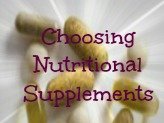How to Improve your Diet
There are three factors that determine your health; diet, exercise, and rest. Have you noticed how many people seem to be 'tired' these days?
Almost every person you speak to answers the standard 'How
are you?' question with an almost standard set of answers. "I'm just so
exhausted," " I can't wait for my holiday to catch up on sleep,"
"My energy just seen so low," "I don't seen to have the
'get-up-and-go' I used to have...."
If you dig deeper, people are more and more prepared to acknowledge that they are feeling really depressed; In fact, popular magazines are increasingly filed with articles on ' how to cope with stress' or ' how to find the natural answers to how mood syndrome' or even more alarmingly, the latest news on a breakthrough antidepressant drug that is being sold to millions and millions of people across the world!
The cause of these conditions may be explained as follows: An ordinary human being has close to 100% health status when young and declines as they age. Science has shown that the life expectancy is about 80 years.
95% of people do not get the nutrients their bodies need; around 75% purposely consume the kind of food that harms the body.
How to Improve your Diet- Feed and protect your Cells

Your body is made up of over 73 trillion cells; each of which requires feeding, repair and protection. Cells form tissues, tissues form organs, and organs form the body.
To keep healthy, your cells need to
assimilate the specific nutrients they need, and remove accumulated waste
products. The responsibility for this “feeding” of the cells falls to the cell membrane- which acts as a “gate-keeper” allowing in required nutrients and
removing waste products.
If this does not happen, your cells
become starved of nutrients and constipated with your own waste. This makes
your cells tired, sluggish and sick- and so are you!
To function properly, your cell membranes need essential plant lipids and
sterols to keep them soft and permeable- not hard and rigid!
If your cells are unhealthy, so are you. Thankfully, they do not have to stay that way. You can make your cells healthy again! If your cells are healthy, you are too!
How to Improve your Diet
Diet change starts with recognizing the areas that you need to change and then working on those areas. For instance, some people simply need to add vegetables to their daily meals and cut back on meat. Others need to cut back on sweets and add fruits and vegetables.
Some people could do themselves a lot of good by eating a breakfast so that they do not overeat later in the day. These are little changes that can be made if you are motivated to do so. The key is to make small changes so that they are seamlessly incorporated into your life.
Eating healthy also means different things to different people. A healthy runner who runs a half marathon every other weekend doesn't have the same nutritional requirements as an office worker who sits at a desk all day and needs to lose 20 pounds.
A good place to start is to begin by adding variety. Make smarter choices when shopping and try to avoid the sugary temptations that lurk in the grocery store. If you eat out a lot, you can still make better choices. Limit your salad dressing and eat more vegetables and skinless chicken. It is also a good idea not to eat your whole plateful of food.
Balance and Variety in your Food
Each food group provides specific nutrients. Eating foods from all food groups each day covers your bases for a balanced-diet.
Breads, cereals, rice and pasta provide carbohydrate. So do fruits and vegetables. Meat, poultry, fish, dry beans, eggs and nuts are major contributors of protein, iron and zinc. Dairy products give us protein, carbohydrate and calcium.
Not only is it important to eat foods from all food groups, it’s important to eat a variety of foods within each food group to make sure you get all the needed nutrients.
In other words, eating three servings of potatoes won’t give you as many vitamins and minerals as eating one serving each of carrots, broccoli and potatoes.
The recommendation to use fats, oils and sweets sparingly is based on concerns about excess calorie intake in non-active persons. The more active you are, the more calories you burn, and the more calories you burn, the more you can eat from the tip.
Diet Related Articles
The Dos and Don'ts of a Runner's Diet (jogging101.com) - Follow these tips for a runner's diet about foods to eat and to avoid so you can improve performance.








New! Comments
Have your say about what you just read! Leave me a comment in the box below.